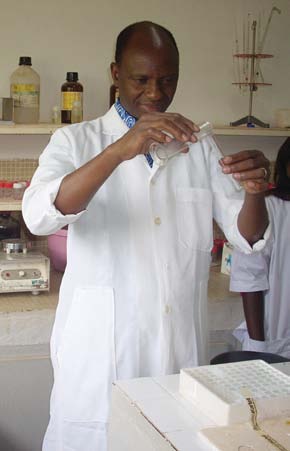A researcher in Burkina Faso finds what he needed to lift his work to international standards
Until September 2008, Sami Hyacinthe Kambire, an agronomist in Burkina Faso’s Institute for Environment and Agricultural Research (INERA by its French acronym), was a frustrated researcher. Although part of the Ministry of Scientific Research and Innovation, INERA, like most research organizations in the country, could little afford subscriptions to up-to-date international journals.
“This situation was untenable. Without access to scientific information, it is impossible to formulate relevant research topics, and write and publish quality scientific articles. It is impossible to work effectively as a researcher.”
Research revolution

Then, in 2008, he attended a training session run by the Information Training and Outreach Centre for Africa (ITOCA), an organization that improves information and communications technology skills for researchers in sub-Saharan Africa. Dr Kambire describes the moment that ITOCA introduced him to AGORA as “a real revolution in my life as a researcher”, which boosted immeasurably his confidence in his own work.
Working in INERA’s Department of Natural Resources Management and Production Systems, Dr Kambire is a specialist in soil fertility management, soil and water conservation, and environmental assessment. He also teaches agronomy students from the Université Polytechnique de Bobo Dioulasso and the Centre Agricole Polyvalent de Matourkou. Gaining exposure to the world-leading research available via AGORA has had a profound effect on his work. Given his newfound access to relevant literature, Dr Kambire can perform research much faster and his scientific writing ability has improved substantially, for both research papers and funding proposals.
This increase in efficiency has boosted his research output. Before AGORA, Dr Kambire found that he often devoted large amounts of time to research that had already been performed elsewhere. But without access to journals, he had no way of knowing if he was doing work that had been done before. He cites. as an example his 2002 research on the effect of organic fertilizers on tomato wilt caused by the fungus Ralstonia solanacearum. The disease, which attacks the leaves of the tomato plant, makes it impossible to grow tomatoes in the dry season in several regions of Burkina Faso.

Dr Kambire was anxious about his research from the start, given that his most recent reference was a disconcerting 13 years old. Nevertheless, refusing to let his work sit in a drawer and gather dust, he wrote up the paper and submitted it for publication. Several months later, he received the rejection that he had almost anticipated. Sure enough, one of the reasons for the rebuff was that he had cited out-of-date references. Unable to access more recent literature, he reluctantly filed the paper away, unseen by agronomists elsewhere.
«AGORA is a powerhouse of scientific research for those interested in real science.»
Unwelcome discovery
Several years later, when Dr Kambire experienced his career-changing moment, the first thing he did was to use AGORA to search for research on tomato wilt. He was shocked to discover a large number of papers on the topic, from several countries. It was a defining moment: for years he had assumed he was one of few researchers working on this problem; all of a sudden he was faced with the reality that his work was not as original as he had thought. Encouragingly, however, results from other researchers confirmed his own.
In 2011, Dr Kambire plans to complete and submit at least four research papers, something that he could not have contemplated before AGORA. He has already submitted two papers, on determining the critical level of soil organic matter in Burkina Faso’s smallholder farming systems, and on predicting maize yield using rainfall data during the rainy season planting period.
With his improved understanding of developments in his field, he knows that his work is relevant and he is confident discussing research issues with leading scientists worldwide. This broader knowledge has also boosted his ability to win international funding for his work, including a current project on strengthening capacity for the diagnosis and integrated management of pest problems in Burkina Faso. Armed with the latest information, his teaching quality has improved as well.
AGORA has opened Dr Kambire’s eyes to the importance of information management. In this light, he has become a strong advocate of researchers working more closely with librarians. He feels that this relationship is not strong, with African researchers unaware of how librarians can help them, and librarians under the impression that researchers undervalue their efforts.
“Researchers should thank the librarians, who help find their bibliographies. The work they perform is science without acknowledgement.»
This story is part of the Making a Difference case study collection. Read more stories from Research4Life users.





